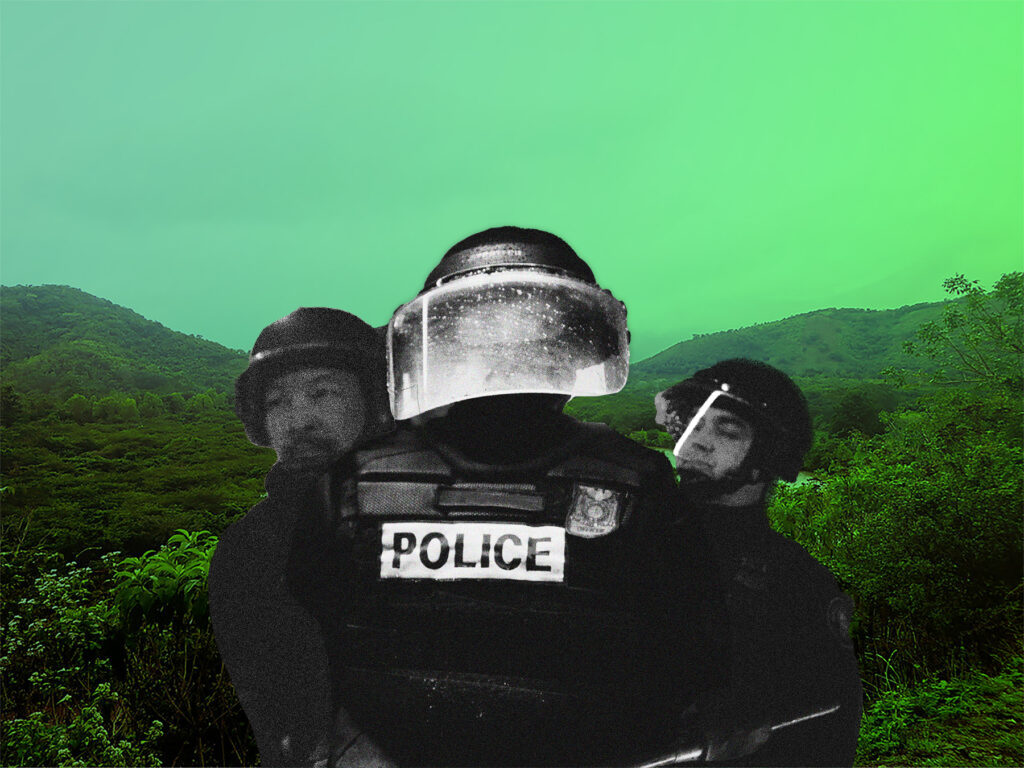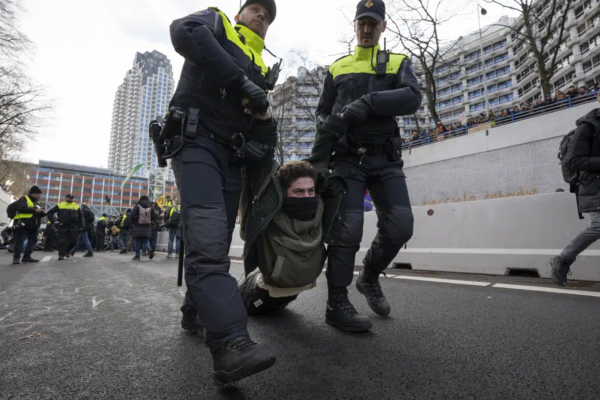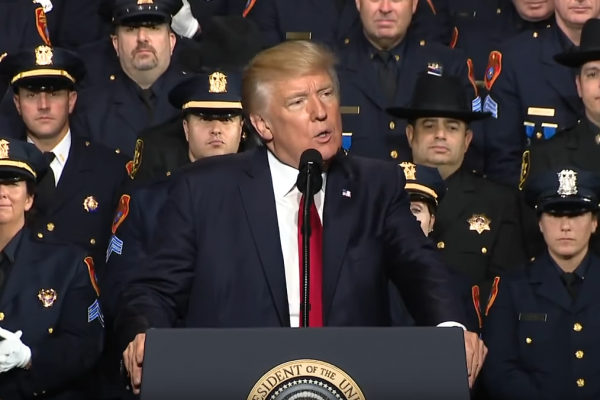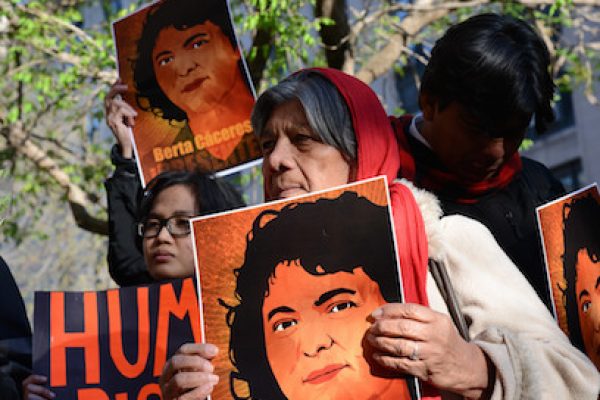This essay appears in print in Reclaiming Freedom.
On January 18 the Atlanta police, DeKalb County police, Georgia state troopers, and a SWAT team descended on a protest encampment in the Weelaunee Forest, armed with dogs, pepper bullets, and live ammunition. They shot and killed twenty-six-year-old Manuel Paez Terán (also known as Tortuguita), a young Indigenous Venezuelan who had been protesting the clearing of the forest to build the Atlanta Public Safety Training Center, known to those who have spent the past two years opposing it as Cop City.
Even after their death, which Kamau Franklin of the group Community Movement Builders, a Black, member-based collective of community residents and organizers, rightly called a “political assassination,” the officers continued with the violent clearing operation, cutting tree limbs and ropes from under tree sitters and attacking protesters with rubber bullets and tear gas. The official autopsy, finally released in April, reveals that Tortuguita was shot over fifty times. Researchers and journalists have called the shooting “unprecedented”; according to The Guardian, it is the first known instance of state forces in the United States killing an environmental protester.
Just eleven days after Tortuguita’s murder, two water defenders from Guapinol, Honduras, Aly Domínguez and Jairo Bonilla, were assassinated by unidentified gunmen. The two were cofounders of a group responsible for leading an occupation of the Los Pinares mine to protest against exploitative mining operations which would pollute their water source, the Guapinol River. The Honduran government has refused to investigate the matter further, instead blaming the murders on a robbery attempt.
Between December 2022 and February 2023, at least seven land defenders and community members across the Bajo Aguán region—a fertile and heavily militarized region in Northern Honduras—were killed, including campesino leader Hipolito Rivas of the Gregorio Chavez Cooperative, his son Jose Omar Cruz Tome, president of the Los Laureles cooperative, and his father-in-law, Andy Martinez Murrillo. For decades, communities in the Bajo Aguán and international solidarity organizations have denounced the collaboration between private security firms working for palm oil and mining corporations and military and police-backed paramilitary forces heavily supported by the United States to violently repress organized opposition to the land theft and environmental destruction upon which the industries depend.
Meanwhile, in northern El Salvador, just a week before the deadly raid in the Weelaunee forest, state police were engaged in a raid of their own. Residents of the rural community of Santa Marta awoke in the middle of the night to sirens and floodlights as police arrested Antonio Pacheco, the executive director of the Association of Economic and Social Development (ADES) of Santa Marta, who helped lead El Salvador’s powerful anti-mining movement. Four other community leaders—Miguel Ángel Gámez, Alejandro Laínez García, Pedro Antonio Rivas Laínez, and Saúl Agustín Rivas Ortega—were also arrested. The scene was all too familiar to a community that suffered a horrific massacre and brutal state violence during El Salvador’s U.S.-backed war against leftist revolutionary forces in the 1980s.
So while the Georgia State Patrol’s murder of Tortuguita marks a grave first in the United States, the killing of land defenders is heartbreakingly common in South and Central America. Latin America has long been the deadliest region for human rights and environmental defenders. In its 2022 analysis, Frontline Defenders noted that four out of the five countries contributing to 80 percent of the murders of human rights defenders worldwide that year were in Latin America. Other reports show that 75 percent of all killings of environmental activists worldwide have occurred there, and that it is particularly deadly for indigenous environmental activists. These statistics reveal what land defenders across the world have long known: state violence against environmental protesters is not confined to the United States.
But if not exclusively contained within its borders, the United States certainly has had an active role in its spread. It has a long history in Latin America of promoting economic policies to benefit corporations engaged in extractive and otherwise exploitative industries, while simultaneously training, arming, and supporting the state and paramilitary forces that brutally repress those who resist such policies. In short, the U.S. brand of policing—the kind that would be taught and exported from Cop City—exists to protect capital and property. The crackdown against those fighting it, in Atlanta and in Honduras, El Salvador, and across the world, offers a frightening glimpse into a potential future: one of increasing state violence against communities everywhere who struggle to defend water, land, and ecosystems from corporate greed.
In Atlanta, communities have been organizing to protect roughly ninety acres of the South River Forest, known to the Muscogee (Creek) people as Weelaunee Forest, not from the ravages of mining, palm oil plantations, logging, or hydroelectric dams—the major forces behind land grabs in Central America—but from the construction of a police base. The City of Atlanta, Atlanta Police Department, and the Atlanta Police Foundation (APF) developed the idea for the Atlanta Public Safety Training Center after the 2020 uprisings against police violence. Its plans feature an explosives testing area, over twelve firing ranges, a Black Hawk helicopter landing pad, a training center to practice crowd control, a driving course for police to practice chases, and a “mock village” with a hotel/nightclub and convenience store. Cop City, twice as large as facilities in New York and Los Angeles, would be the largest of its kind nationwide.
In September 2021, the Atlanta City Council approved Cop City by a 10–4 vote and leased the land to the APF, a nonprofit organization that funnels private money to policing and surveillance of Atlanta residents. Supporters argue that current training facilities are “substandard,” and the “Atlanta Public Safety Training Center” is necessary to boost police morale and retention. Residents opposed Cop City during seventeen hours of recorded public comment in 2021 and again in 2023.
The construction would deplete Atlanta’s tree canopy and increase air and noise pollution for the majority Black and working-class neighborhood by the forest. Weapons testing and the shooting range will release heavy metals and toxic chemicals to the already endangered South River which will remain in the soil and water for decades. And Cop City’s estimated $90 million price tag—$30 million from the City of Atlanta and $60 million from APF—does not account for the project’s social and ecological costs.
Cop City is intended to intimidate and hinder movement building, divert much-needed resources away from communities, and exacerbate the surveillance of Black, brown, and other dispossessed communities—not only in Atlanta but across the country and around the world.
Organizers recognize the threat that Cop City poses and have mobilized to oppose increased surveillance and police militarization as well as to protect the forest. However, the state also recognizes the threat these organizers pose to its efforts to build Cop City and has moved swiftly to leverage national and state counterterrorism measures against them meant to criminalize protest and discourage dissent.
The state frequently deploys terrorism as a political label to justify violence against Black and Brown communities. Recently, local Georgia officials and prosecutors have described the prison abolitionist movement as a domestic terror threat, harkening back to 2020, when law enforcement units labeled Black Lives Matter and antifa protests as acts of domestic terrorism. During the “Green Scare” in the mid 2000s, the government prosecuted environmental activists with the Earth Liberation Front and Animal Liberation Front under federal terrorism laws, and ecoterrorism became the top domestic terrorism priority of the Department of Justice. In the late 2010s, the FBI began to classify and further surveil Black Lives Matter organizers as “Black identity extremists.” More recently, organizers protesting the Dakota Access Pipeline have been prosecuted as terrorists.
Now, for the first time, Georgia is using its state domestic terrorism statute against an environmental or antiracist movement. Nearly twenty forest defenders were arrested under the statute between December 2022 and January 2023, a number that has since risen to over forty. Police affidavits cite “criminally trespassing on posted land,” “sleeping in the forest,” “sleeping in a hammock with another defendant,” or being a “known member” of a “prison abolition movement” and “occupying a treehouse while wearing a gas mask and camouflage clothing” as examples of “terrorist” activity. Even bail fund organizers were arrested during a May 31 raid on the Atlanta Solidarity Fund office, facing charges of “charity fraud” and “money laundering.”
Organizers and lawyers had previously warned that Georgia governor Brian Kemp’s “domestic terrorism” law would have disastrous implications for organizers, and are now sounding the alarm over the dangerous legal precedent these charges may set. Under the Georgia statute, domestic terrorism now includes the commission of a felony with the intent to “disable or destroy critical infrastructure,” causing “major economic loss,” and (a) intimidate the civilian population, (b) alter, change, or coerce government policy, or affect the conduct of the government with the use of “destructive devices.” “Critical infrastructure” could be public or private “facilities, systems, functions, or assets,” physical or virtual, and provide or distribute “services for the benefit of the public.” Already, twenty states have enacted similar anti-protest laws to quash environmental defenders.
Local officials in Georgia adopted language about “outside protesters” to justify a “state of emergency” in response to the ongoing resistance to Cop City and the protests after Tortuguita was killed. On January 26, governor Kemp issued an executive order granting him expansive powers, including the deployment of up to one thousand National Guard troops to “subdue riot and unlawful assembly.”
And on August 29, state Attorney General Chris Carr charged sixty-one people, including organizers, a legal observer, and bail fund workers, under Georgia’s Racketeer Influenced and Corruption (RICO) Act, issuing an indictment that links protests related to Stop Cop City with those that occurred in 2020 following the murder of George Floyd. Many of the named defendants are also facing simultaneous domestic terrorism charges, setting a dangerous precedent for the use of RICO to stifle dissent.
This new reality for U.S. environmental activists is one that organized popular movements in Central America, where the police and military have received extensive U.S. training for decades, know all too well.
As in Atlanta, accusations of terrorism have been used to dehumanize the state’s enemies. In El Salvador’s case, environmental activists and community leaders have been labeled as gang members. The charges have also been deployed to justify and glamorize state violence, with government photographs of masses of handcuffed prisoners circulated to simultaneously invoke fear and normalize degradation. The government calls its new prison, claimed to be one of the largest in the world, the “Terrorist Confinement Center.” Against this backdrop, the Bukele regime has arrested not only anti-mining activists, but also union leaders, youth organizers, and political opponents.
The attorney general’s operation against the Santa Marta Five, as the jailed anti-mining protesters have come to be known, occurred amid a campaign of massive arrests launched in March 2022, when the government of Nayib Bukele suspended key constitutional rights under the pretext of combating gang violence. Legislators from Bukele’s party have continuously—and illegally—reapproved a thirty-day emergency measure known as a state of exception for the past sixteen months. The Salvadoran government’s steamrolling of due process has become a nightmare for working-class families whose communities have been militarized, with over 71,000 people arrested, many without warrants, evidence, or investigation. By July 2023, Salvadoran human rights organizations had documented over 6,400 human rights violations, mainly arbitrary arrests, and the deaths of at least 153 people in prison, whether from torture, beatings, or lack of access to medical care. None had been found guilty of a crime.
These policies are the culmination of two decades of U.S.-backed repressive policing. As scholars Leisy Ábrego and Steven Osuna outline, right-wing governments first implemented an “iron fist” antigang plan in El Salvador “modeled on U.S. zero-tolerance policies and broken windows policing” in 2003. Like the counterinsurgency campaigns of the 1980s, the U.S. policing and security strategies exported over the past thirty years have armed governments throughout Central and South America with tools to repress impoverished communities, including those organizing to defend land and water.
In 2006, the far-right Nationalist Republican Alliance (ARENA) administration passed an antiterrorism law modeled closely on the USA Patriot Act. Grassroots organizers in El Salvador loudly opposed the law for its sweeping nature, warning it would open the door to political persecution. Among the first people to be charged under the new statutes were fourteen community activists from the community of Suchitoto who were protesting water privatization. Accompanied by successful international solidarity efforts, they were freed in 2007 and charges were dropped.
The training of security forces in South and Central America is a pillar of U.S. geopolitical strategy in the region: it ensures that those in power remain friendly to U.S. business interests. The infamous School of the Americas, first based in Panama and later relocated to Fort Moore, Georgia (and subsequently rebranded to the “Western Hemisphere institute for Security Cooperation” after being accused of training its graduates in torture and assassination techniques), hosts South and Central American military officers and offers courses from “tactical training to advanced theory on the application of military doctrine.” Among the school’s graduates in El Salvador are Col. Domingo Monterrosa, who led the infamous Atlacatl Battalion that massacred hundreds in El Mozote in 1981, and Roberto D’Aubuisson, who planned the 1980 assassination of Salvadoran archbishop Óscar Romero, an outspoken critic of the military government. The institute remains operational and reports “graduating 1,200–1,900 military, police, and civilian students from across the Hemisphere annually.”
In the mid-2000s, the United States expanded its focus more specifically to policing. In 2005, as part of an effort to shore up confidence for U.S. investors in the newly-passed Dominican Republic-Central America Free Trade Agreement (DR-CAFTA), the Bush administration opened a new branch of the Clinton-era international police training school, the International Law Enforcement Academy (ILEA), in San Salvador. The United States frames this work as police “professionalization”—a suspect term, considering the fact that the United States remains the high-income country with by far the highest rate of police killings in the world. What’s been called the “School of the Americas for police” has graduated thousands of police officers throughout Central and South America who receive training from the FBI, DEA, and other agencies based in the United States, including state and local police forces. As of 2011, these trainings also include courses led by the Atlanta Police Department, through its partnership with the State Department.
In 2007, the Bush administration launched the Mérida Initiative, said to focus on border surveillance and assisting Mexican and other Central American governments in the War on Drugs. Experts argued early on that it would merely strengthen organized crime networks and were soon proven right. The Central America Regional Security Initiative (CARSI) soon followed, which purported to “stop the flow of narcotics, arms, weapons, and bulk cash generated by illicit drug sales” and “[strengthen] and [integrate] security efforts from the U.S. Southwest border to Panama.”
By 2017, the Inter-American Commission on Human Rights was hearing cases regarding rising numbers of extrajudicial killings at the hands of Salvadoran police, and by 2018, the United Nations Special Rapporteur on extrajudicial, summary and arbitrary executions reported “a pattern of behavior amongst security personnel, amounting to extrajudicial executions and excessive use of force,” citing “elements of the legal framework, such as the 2006 Counter-terrorism Law,” as key contributors to these violations.
A key component of U.S. police reform efforts in Central America has been to create, develop and train elite police units to specialize in the fight against organized crime—often to deadly ends. Investigators connected El Salvador’s Specialized Reaction Forces (FES), a joint police and military unit backed by significant U.S. funding, to the murder of forty-three suspected gang members in the first half of 2017 alone. Though officially disbanded, many of its members transitioned to a new U.S.-backed unit, the Jaguars. In neighboring Honduras, the United States heavily invested in the creation of the TIGRES (Intelligence Troops and Specialized Security Response Groups). Launched in 2012, TIGRES officers have, on multiple occasions, been implicated in drug trafficking, corruption, and state repression of protesters.
In recent years, some of the most notorious U.S.-trained security forces around the world have become the trainers, often with funding from various U.S. agencies. Colombian soldiers now offer trainings in Honduras through the United States Southern Command (SOUTHCOM). The Atlanta police, too, have received training from Colombia, as well as from Israel and elsewhere, through a program subsidized by the U.S. Department of Justice. Activists have argued that, if built, Cop City might host similar trainings for international forces.
Through U.S.-funded training and capacity-building programs, many of the most dangerous elements of policing practices now circulate internationally. Since the founding of U.S.-backed police schools in El Salvador, the country’s incarceration rate per capita surpassed that of the United States; it is now the highest in the world.
When Salvadoran president Nayib Bukele appeared on Tucker Carlson’s show on Fox News to celebrate his crackdown, he exhorted the United States to follow in his footsteps. Amid ongoing protests against Cop City, governor Kemp welcomed Salvadoran ambassador Milena Mayorga to Georgia in March. That same month, Mayorga would go on to invite Atlanta mayor Andre Dickens to visit El Salvador on an upcoming delegation. As Georgia and the Salvadoran government forge stronger diplomatic ties, the U.S. export of “expertise” to police and military in Central America is no longer a straight line but has instead come full circle.
Fifteen years ago, the directors of ILEA were remarkably clear when discussing their goals for opening a new police training academy in El Salvador: to make Latin America “safe for foreign investment” by “providing regional security and economic stability and combating crime.” Such comments were recently echoed by Laura Richardson, head of SOUTHCOM for Latin America, when she framed the importance of U.S. military operations in Latin America in terms of the region’s “rich resources and rare earth elements,” like lithium and oil.
It’s not a coincidence that corporations from Wells Fargo to Axon, the manufacturers of tasers, have been major donors to the Atlanta Police Foundation for the construction of Cop City and to police foundations across the country. They know, like the police they fund, that the battles over access to land and natural resources like water will only increase as the climate crisis intensifies, and are acting accordingly.
But there is some room for hope. The Defend the Atlanta Forest/Stop Cop City movement, guided by antiracist, Indigenous, abolitionist principles and environmental politics, has successfully halted the project thus far, with the help of protesters who have occupied the forest since late 2021. These defenders use a variety of tactics: encampments, tree-sits, peaceful marches, community events, and investigative research. The initial and ongoing resistance has forced the city to reduce the project’s scale from over 150 acres to 85 and promise to preserve the surrounding forest as a 265-acre public park.
Land and water defenders in El Salvador, too, have successfully prevented mining operations. In 2017, the country became the first in the world to ban metal mining, due in large part to the communities who worked relentlessly for nearly two decades to organize against it, despite threats and harassment. Other communities and movements throughout the region are following suit, refusing to give in to coercive and violent U.S.-backed military and paramilitary forces. In a 2015 case in Honduras, the Inter-American Commission on Human Rights found that the state violated the human rights of the indigenous Garifuna communities by expanding urban developments into the community’s land. This decision marked a victory for the recognition of Garifuna land rights, though the Honduran government has yet to implement any measures in accordance with the decision.
Environmental movements have also been able to fight back against the criminalization of land and water defenders. After an international outcry, the charges against eight water defenders from Guapinol, arrested in 2019 for opposing the Los Pinares mining project, were dropped in 2022. And on September 5, the five Santa Marta water defenders arrested in January were moved from prison to house arrest following an international campaign, though the struggle to drop all the charges against them continues.
That the United States’ investment in controlling territories, resources, and entire populations through policing now mirrors the tactics that it helped usher into existence in Central America is cause for concern. But it is also an indicator that the movements against them in both in the United States and Central America are capable of posing significant threats to the racialized order that such investment seeks to uphold through shared tactics such as legal attacks and terrorist labeling. Despite the risks, organized communities in Central America are not backing down. Nor are the organizers in Atlanta. Together, they are envisioning urgently needed alternatives to both environmental destruction and militarization.
The author would like to thank the Committee in Solidarity with the People of El Salvador (CISPES) for their contributions toward research for this article.
We’re interested in what you think. Submit a letter to the editors at letters@bostonreview.net. Boston Review is nonprofit, paywall-free, and reader-funded. To support work like this, please donate here.









